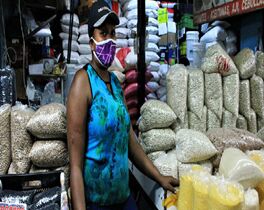中南美洲已成新冠密集传播区
|
The World Health Organization (WHO) said on Monday that Central and South America have now become intense zones of COVID-19 transmission, and solidarity and support are needed to help them overcome the virus. "I would certainly characterize that Central and South America, in particular, have very much become the intense zones of transmission for this virus as we speak, and I don't believe that we have reached the peak in that transmission. And at this point, I cannot predict when we will," Dr. Michael Ryan, executive director of WHO Health Emergencies Programme said in a press conference on Monday in Geneva.
"Five of the ten countries worldwide reporting the highest new number of cases in the past 24 hours are in the Americas: Brazil, USA, Peru, Chile and Mexico, and ... the biggest increases are (in) Brazil, Colombia, Chile, Peru, Mexico, Haiti, Argentina, Bolivia. And while the numbers are not exponential in some countries, we are seeing a progressive increase in cases on a daily basis," he said. "And countries are having to work very hard to both understand the scale of infection, but also health systems are beginning to come under pressure across the region." The Americas offer a mixed picture of COVID-19 responses on a national level, Dr. Ryan continued, with some countries taking what he described as an "all-of-government, all-of-society, inclusive, scientific-driven approach" to tackling the disease, and others struggling. Ryan said that despite good examples of some countries with inclusive, science-driven approaches, "absence and weakness" are seen in others. "The complexities of the population structure, the number of people living in urban settings, the urban poor, there are so many factors that drive and increase the intensity of transmission," he added. Dr. Ryan called for support and international solidarity for countries in the region. "Clearly the situation in many South American countries is far from stable. There's been a rapid increase in cases and those systems are coming under increasing pressure and they need our support, they need our solidarity," Ryan said. "We're particularly concerned about places like Haiti, because of the inherent weakness in the system. There are other countries in the Americas in which health systems are also weak," he said. Last month, an advisory group with the UN's Economic and Social Council (ECOSOC) warned that the pandemic could trigger a humanitarian catastrophe in the Caribbean island nation, where six million people already live below the poverty line. "We need to stand with them, we need to provide the support that we can to help them overcome this virus, as we have done collectively for countries in other regions. It is time to stand together and leave no one behind," he emphasized. |









